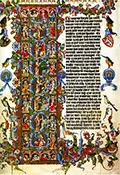Wenceslaus IV: King of Germany
Wenceslaus was King of Germany for 24 years at the end of the 14th Century. His reign was known for its turbulence. 
He was born on Feb. 26, 1361 in Nuremberg. His father was the reigning Holy Roman Emperor, Charles IV, and his mother was Anna von Schweidnitz. Like many monarchs, Charles was obsessed with an orderly succession; he had his son crowned King of Bohemia when the boy was 2 and King of the Romans (Germany) when he was 15. Charles counted on powerful nobles for support. When he took away the privileges of some of these nobles and sold them to other nobles, the aggrieved parties banded together and formed a league, the Swabian League of Cities, in 1376. In the following decade, Wenceslaus took advantage of infighting to dismantle the league and regain control of the cities. Charles IV died in 1378, having divided his lands among his sons and other family members, leaving Wenceslaus with less power and holdings than his father had. Thus, on two separate occasions, recalcitrant nobles were able to have Wenceslaus arrested. Acting in his role as King of Bohemia, Wenceslaus protected religious reformer Jan Hus from persecution by the Catholic Church. That protection lasted only so long, and Hus was killed in 1415 after being branded a heretic. (As a result, that part of Germany descended into armed conflict for nearly two decades.) That series of events took place against the backdrop of the Great Schism, a split among Church leaders that, for a time, resulted in two lines of popes, one in Rome and the other in Avignon. Wenceslaus knew how to make enemies. He refused to accept the crown of the Holy Roman Empire, angering the pope. Many church leaders also blamed him for not doing more to stop the Great Schism. He alienated many in Germany by spending most of his time in Prague and other non-German lands. He lost his crown on Aug. 20, 1400, when three archbishops and a group of powerful nobles declared him deposed, replacing him with Count Palatine Rupert III. Wenceslaus endured imprisonment at the hands of his own brother, Sigismund, who had his own agenda. Wenceslaus remained in captivity in Vienna for more than a year and then escaped, still claiming the kingship as he returned to Bohemia. 
During these uncertain years, Wenceslaus maintained his faith and had created a stylishly illuminated manuscript that has come to be known as the Wenceslas Bible. It was one of the earliest translations of the Bible into German. Church and political leaders ended the Great Schism in Wenceslaus's lifetime but without much help from him. His brother Sigismund had a far more leading role in ending the wide-ranging religious conflict, arranging the Council of Constance, which settled things in 1418. Wenceslaus died the following year, of a heart attack while hunting in the woods near his castle at Kunratice, which is today part of Prague. He had married twice, in 1370 to Joanna of Bavaria (who died in 1386) and in 1389 to Sofia of Bavaria. Neither marriage produced children. |
|
Social Studies for Kids
copyright 2002–2024
David White




